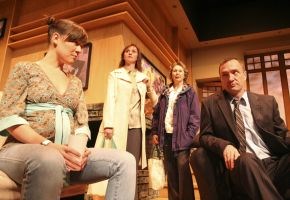BY LIBBY DORNBUSH
If you see one play in Sudbury this year, Rabbit Hole should be that play.
Rabbit Hole, the Pulitzer Prize winning play by young American author David Lindsay-Abaire, is by far the strongest production in what has been a discouragingly weak season at Sudbury Theatre Centre.
Following the slight silliness of the Complete Works of Shakespeare and Wingfield's Inferno, and the cliché-ridden, hanky-waving, Oprah-approved Tuesdays with Morrie, and preceding the lightweight Buddy Holly Story, Rabbit Hole shows Sudbury audiences once again that, given an excellent script and some gifted actors, George Pothitos is more then capable of working magic on the STC stage. Throw in one of Geofrey Dinwiddie's spectacular sets and the result is an interesting and intelligent evening of theatre.
Rabbit Hole is a play about grief, about the effect on four family members when a young son is accidentally killed. It is quiet and understated. While the audience was hanging on every word several times in this play, it does not insist that you must join in the tears.In fact, there were numerous moments of humour, as there are in any tragedy, not 'comic relief" moments, but genuine bits of funniness that anyone who has been through great loss will recognize as real.
The success of this play hinges on the quality of the acting, and that quality was certainly there opening night. The performances, like the writing, are understated. There are no historical confrontations, no tear-jerking laments, no cliché-ridden attempts at comfort. What we see instead are the all too real attempts of people to quietly live with, and through, their personal grief and toward possible hope for the future.
The only performance that does not merit the label of understated is Jody Stevens' wonderful all out fling as the younger daughter with a history of unspecified mistakes. She's the rebel, the odd dresser, the outspoken, too loud, delightful character that acts as a lively foil for the repressed grief of the others, especially her sister Becca, the dead child's mother. Inside this devil may care character, however, is another portrait of grief, and below the surface, an intelligent awareness of those around her.
Deborah Drakeford portrays Becca, a rigidly self-controlled woman who is burying her grief in an excessively ordered life of cleaning and disposing, with a quietness that is more frightening and effective then any screaming, wailing grief would be. Every word, every gesture is permeated with the fact of the child's death. In contrast to her husband, who is vacillating between the past, in the form of videotapes of the dead child, and renewing his closeness with his wife, her isolation is extreme. Every word and gesture holds the potential for more pain, and the others move around her with caution.
Her own mother, Nat, has suffered losses of her own, and has the more experienced view of age to assure her that all pain lessens with time. Elva Mai Hoover's interpretation of this woman seemed never to settle on a definitive characterization though; her words seemed to be more outrageous then their speaking. The wonderfully funny Kennedy monologue might have benefited from some of Izzy's outspokenness.
This is a quibble, though, in an evening of tight, well disciplined acting.
The role of Jason, the young driver who killed the boy, is played by local actor and Thorneloe University student Nathan Lambovitch, who brings a nice tentativeness and youthful lack of certainty to the role. His intrusion into the family forces the denouement, such as it is. But still, there are no profound changes, and no easy answers; there are, rather, tentative movements toward each other, slight indications that there may be hope in the future.
Rabbit Hole is a reflection of the real world, in which grief goes on, sometimes forever, but life goes on too, and it is a sensitive balance, not easily found.
This author, this director, and this cast seem to have found a great deal of that balance.
Libby Dornbush writes about theatre for Northern Life.
